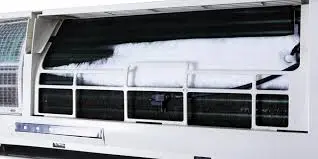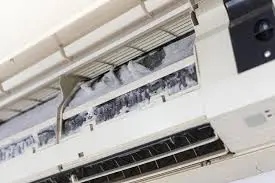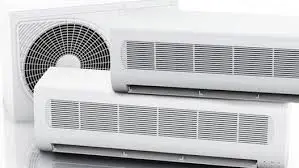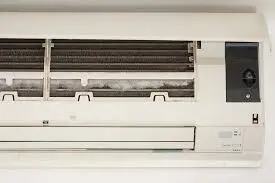Air conditioners are essential for maintaining comfort during hot weather. However, it’s not uncommon for AC units to experience freezing issues, which can reduce their efficiency and cause damage. In this article, we will explore common reasons why your AC is freezing up and provide insights into preventive measures.
Why Is My AC Freezing Up?

Understanding why your AC is freezing up can help you address the issue promptly. Several factors can contribute to this problem, ranging from airflow restrictions to refrigerant issues.
Restricted Airflow
One of the most common reasons for an AC unit to freeze up is restricted airflow. When air cannot move freely through the system, the evaporator coil can get too cold, leading to ice formation.
Causes of Restricted Airflow
- Dirty Air Filters: Clogged filters restrict airflow, causing the evaporator coil to freeze.
- Blocked Vents: Furniture or other objects blocking vents can impede airflow.
- Dirty Evaporator Coil: Dust and debris on the coil can reduce heat absorption.
Refrigerant Issues
Low refrigerant levels or leaks can also cause your AC to freeze up. The refrigerant is responsible for absorbing heat from the air, and when levels are low, the evaporator coil can become too cold.
Signs of Refrigerant Problems
- Ice on the Coil: Visible ice on the evaporator coil.
- Hissing Sounds: Indicates a possible refrigerant leak.
- Reduced Cooling: AC unit not cooling effectively.
What Temp Should You Set Your AC?
Setting your AC to the correct temperature is crucial for preventing freezing issues. Ideally, your thermostat should be set between 72°F and 78°F. Setting it too low can cause the system to overwork, leading to freezing.
AC Drain Tube Issues
The AC drain tube is responsible for removing condensation from the system. If the drain tube is clogged, water can back up and freeze on the coil.
Maintaining the AC Drain Tube
- Regular Cleaning: Ensure the drain tube is free from debris.
- Check for Blockages: Inspect the tube for any obstructions regularly.
- Use a Wet/Dry Vacuum: To clear any clogs in the drain tube.
Why Is My AC Condenser Freezing Up?

The condenser unit can also freeze up due to airflow issues or refrigerant problems. Ensuring that the condenser has adequate airflow and maintaining proper refrigerant levels can prevent this issue.
Best Practices for Condenser Maintenance
- Keep the Area Clear: Remove any debris around the condenser unit.
- Regular Inspections: Check for signs of refrigerant leaks or damage.
- Professional Maintenance: Schedule regular maintenance with an HVAC technician.
Black Mold in AC Window Unit
Black mold can grow in AC window units due to excess moisture. Mold can restrict airflow and contribute to freezing issues.
Preventing Mold Growth
- Regular Cleaning: Clean the AC window unit regularly to prevent mold.
- Control Humidity: Use a dehumidifier if necessary.
- Proper Ventilation: Ensure the area around the AC unit is well-ventilated.
Solar AC Systems
Solar AC systems are an eco-friendly alternative that can reduce energy costs. They use solar panels to power the air conditioning unit, which can help in areas with abundant sunlight.
Benefits of Solar AC
- Energy Efficiency: Reduces reliance on the electrical grid.
- Cost Savings: Lower energy bills over time.
- Environmental Impact: Reduces carbon footprint.
AC Tax Credit 2023
The AC tax credit for 2023 offers financial incentives for homeowners who install energy-efficient air conditioning systems. These credits can help offset the cost of new installations and encourage the adoption of eco-friendly technologies.
Eligibility for AC Tax Credit
- Energy Star Certification: Ensure the new AC unit is Energy Star certified.
- Proper Documentation: Keep receipts and documentation for tax purposes.
- Consult a Tax Professional: Verify eligibility and understand the claiming process.
Size Of Air Conditioner

What Size Air Conditioner Do I Need, Choosing the right size air conditioner is essential for efficient cooling and preventing freezing issues. An AC unit that is too small will overwork, while one that is too large will cycle on and off frequently.
Factors to Consider
- Room Size: Measure the square footage of the area to be cooled.
- Insulation Quality: Consider the insulation level of the building.
- Climate: Account for the local climate and average temperatures.
New HVAC System Cost
The cost of installing a new HVAC system varies based on several factors, including the size of the system, the type of unit, and installation complexity. It’s essential to get multiple quotes and consider long-term energy savings when choosing a new system.
Factors Influencing Cost
- System Size: Larger systems typically cost more.
- Installation Complexity: More complex installations can increase labor costs.
- Energy Efficiency: Higher efficiency units may have a higher upfront cost but lower operating costs.
HVAC Rebates 2023
In addition to tax credits, various rebates are available in 2023 for installing energy-efficient HVAC systems. These rebates can significantly reduce the cost of new installations.
Finding HVAC Rebates
- Utility Companies: Check with local utility providers for available rebates.
- Manufacturer Promotions: Look for manufacturer rebates and promotions.
- Government Programs: Explore federal and state incentive programs.
When to Take AC Out of Window
Removing the AC unit from the window at the end of the cooling season can help prevent damage and extend its lifespan. This is particularly important in regions with harsh winters.
Tips for Removing AC Units
- Timing: Remove the unit before freezing temperatures set in.
- Proper Storage: Store the unit in a dry, cool place.
- Inspection: Check for any signs of wear or damage before storing.
Best Mini Split AC
Mini split AC units are an excellent option for homes without ductwork. They offer flexibility and energy efficiency, making them a popular choice for homeowners.
Advantages of Mini Split AC
- Zoned Cooling: Allows for temperature control in different areas.
- Energy Efficiency: Reduces energy consumption compared to central systems.
- Easy Installation: Requires less invasive installation compared to ducted systems.
Conclusion
Understanding the common reasons why your AC is freezing up can help you take preventive measures and maintain an efficient cooling system. From ensuring proper airflow and refrigerant levels to maintaining components like the AC drain tube and addressing mold issues, proactive maintenance is key. Additionally, considering new technologies like solar AC systems and taking advantage of tax credits and rebates can provide long-term benefits. By staying informed and proactive, you can ensure your AC unit operates smoothly and efficiently throughout the cooling season.
